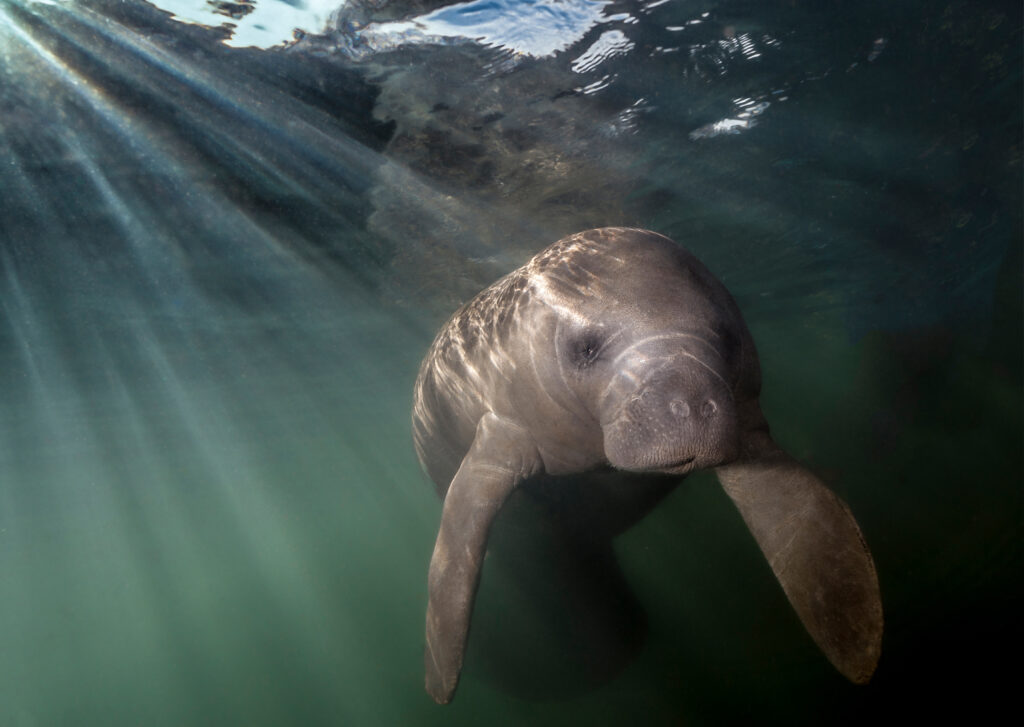Commonly dubbed the “sea cow”, this lovable aquatic relative of the elephant can be found in many coastal areas of the southern United States, particularly in Florida. The manatee population resides in the shallow, warm waters of these areas where their favorite meal, sea grass, is plentiful. Unfortunately, the manatee population faces many challenges in a world of human-made threats. November was officially named Manatee Awareness Month in the year of 2005 to help raise awareness about these dangers and how we, as humans, can lessen these threats to help protect these gentle giants. Read on to discover how you can make a positive impact whether you reside in coastal Florida or anywhere else in the world.
Threats to the Manatee
Manatee survival faces many man-made threats, a majority of which are avoidable. The leading cause of harm to manatees is watercraft collisions. Manatees, being air-breathing mammals, stay close to the surface when wading in deeper waters, therefore collisions with propellers or boat hulls can inflict serious, life-threatening wounds.
The greatest long-term threat to the manatee is loss of the warm-water habitat that they need to survive. Manatees can not survive in sustained temperatures below 68 degrees Fahrenheit and the past few winters have proved to cause cold stress among the Florida manatee population. Due to residential development, natural warm water springs that the manatees use to stay warm have been reduced and instead they flock to electric power plants to access warm water in the winter months. As aging plants begin to shut down, the manatee will have to search elsewhere for natural warm waters.
The third major threat to manatees is human disturbances. When a human disturbs a manatee in its natural habitat it can cause altered breeding, feeding, and sheltering behaviors. Feeding manatees, chasing them from warm water sites, poking, grabbing or separating a mother and her calf can result in serious harm to the manatee. Interfering with the animal’s natural behaviors can cause unneeded stress and can put the manatee in harm’s way.
How You Can Help in Florida
Florida is known for its amazing year-round boating scene and nothing should stop you from enjoying the beautiful views and getting that personal glimpse at amazing Florida wildlife. However, there are precautions you can take that will make a huge difference in the safety of manatees.
If you operate a boat or other type of watercraft, be alert and always keep your eyes out for manatees. It is important that you obey posted speed zone waterway signs. Reducing boat speed gives you a better chance to spot manatees and avoid them. Look for signs of manatees such as a swirl or flat spot in the water where their snouts may be breaking the surface. Always wear polarized sunglasses on the water to avoid glare and increase visibility beneath the water’s surface. Stay in deep water channels and avoid boating over shallow seagrass beds where manatees may be feeding.
If you come across a manatee, do not feed or provide them water. This includes spraying hoses into the water which can attract the animals to a dock or watercraft putting them in harm’s way. Never touch, ride, or chase a manatee in the wild. This could cause a mother to be separated from her calf or drive the manatee out of its warm water home. Report any harassment, accidents, or orphaned manatees to the Florida Fish and Wildlife Conversation Commission by calling the Wildlife Alert number: 1-888-404-3922.
Adopt a Manatee
You don’t have to be a Floridian or avid boater to contribute to manatee conservation. There are many ways you can raise awareness and provide help from the comfort of your home. In fact, you can adopt one! That’s right, symbolically adopting a manatee helps save real animals in the wild. You’ll receive a certificate and photo of your adopted manatee. Your adoption supports conservation work including advocating for slow-speed zones and fighting for establishment of protected areas where manatees can spend the winter.
Want to safely view manatees in their natural habitat? Book a tour on the Manatee to experience Central Florida wildlife in its element. You’ll enjoy the relaxing two-hour boat ride and your chance to spot a pod of dolphin or soaring osprey. Although the manatees are heading inland to warmer waters for the winter, don’t miss your chance to wish them farewell until spring. Reserve your spot today!

